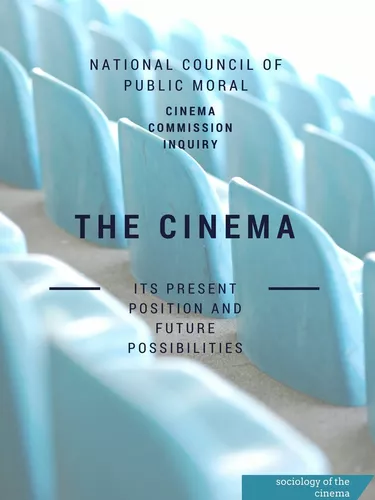Skip to the end of the images gallery Nav bascule
Skip to the beginning of the images gallery Nav bascule

The Cinema
Its Present Position and Future Possibilities
ePUB
2,1 MB
DRM : pas de protection
ISBN : 9782322096817
Éditeur : BoD - Books on Demand
Date de parution : 19.08.2016
Langue : anglais
Accessibilité: Accès limité
3,99 €
TVA incluse
Téléchargement disponible dès maintenant
Votre propre livre !
Devenez auteur avec BoD et vendez votre livre et votre ebook en librairie.
En savoir plusRÉSUMÉ :
"The Cinema: Its Present Position and Future Possibilities" est une exploration fascinante de l'évolution du cinéma au début du XXe siècle, rédigée par la Cinema Commission Inquiry sous l'égide du National Council of Public Morals. Cet ouvrage examine de manière approfondie le rôle du cinéma dans la société, ses impacts culturels et moraux, ainsi que ses perspectives d'avenir. À une époque où le cinéma était encore une industrie naissante, ce livre analyse les préoccupations morales et sociales associées à ce nouveau média, tout en soulignant son potentiel éducatif et artistique. Le texte aborde également les défis réglementaires auxquels l'industrie cinématographique était confrontée, ainsi que les opportunités offertes par les avancées technologiques de l'époque. En intégrant des témoignages et des études de cas, l'ouvrage offre une vision nuancée de la manière dont le cinéma pouvait influencer les comportements sociaux et les valeurs culturelles. Les auteurs plaident pour une régulation prudente et une reconnaissance du cinéma en tant que forme d'art légitime, capable d'éduquer et d'enrichir le public. "The Cinema" reste un document historique essentiel pour comprendre les débuts du cinéma et les débats qui ont façonné son développement.
L'AUTEUR :
La Cinema Commission Inquiry, sous l'égide du National Council of Public Morals, est un collectif d'experts formé au début du XXe siècle pour examiner l'impact du cinéma sur la société. Ce groupe était composé de penseurs influents, de sociologues, d'éducateurs et de représentants religieux, tous préoccupés par les effets moraux et sociaux du cinéma, un média alors en pleine expansion. Le National Council of Public Morals, fondé au Royaume-Uni, avait pour mission de promouvoir des normes morales élevées dans la société, en particulier face aux nouvelles technologies et formes de divertissement. Bien que les membres individuels de la commission ne soient pas largement connus aujourd'hui, leur travail collectif a laissé une empreinte durable sur la manière dont le cinéma est perçu et régulé. Leur rapport, "The Cinema: Its Present Position and Future Possibilities", est une analyse pionnière qui a contribué à façonner les politiques publiques concernant le cinéma et a aidé à établir le cinéma comme un outil potentiellement éducatif et culturel. L'ouvrage reflète les préoccupations de son époque tout en offrant une perspective visionnaire sur le rôle du cinéma dans la société moderne.
"The Cinema: Its Present Position and Future Possibilities" est une exploration fascinante de l'évolution du cinéma au début du XXe siècle, rédigée par la Cinema Commission Inquiry sous l'égide du National Council of Public Morals. Cet ouvrage examine de manière approfondie le rôle du cinéma dans la société, ses impacts culturels et moraux, ainsi que ses perspectives d'avenir. À une époque où le cinéma était encore une industrie naissante, ce livre analyse les préoccupations morales et sociales associées à ce nouveau média, tout en soulignant son potentiel éducatif et artistique. Le texte aborde également les défis réglementaires auxquels l'industrie cinématographique était confrontée, ainsi que les opportunités offertes par les avancées technologiques de l'époque. En intégrant des témoignages et des études de cas, l'ouvrage offre une vision nuancée de la manière dont le cinéma pouvait influencer les comportements sociaux et les valeurs culturelles. Les auteurs plaident pour une régulation prudente et une reconnaissance du cinéma en tant que forme d'art légitime, capable d'éduquer et d'enrichir le public. "The Cinema" reste un document historique essentiel pour comprendre les débuts du cinéma et les débats qui ont façonné son développement.
L'AUTEUR :
La Cinema Commission Inquiry, sous l'égide du National Council of Public Morals, est un collectif d'experts formé au début du XXe siècle pour examiner l'impact du cinéma sur la société. Ce groupe était composé de penseurs influents, de sociologues, d'éducateurs et de représentants religieux, tous préoccupés par les effets moraux et sociaux du cinéma, un média alors en pleine expansion. Le National Council of Public Morals, fondé au Royaume-Uni, avait pour mission de promouvoir des normes morales élevées dans la société, en particulier face aux nouvelles technologies et formes de divertissement. Bien que les membres individuels de la commission ne soient pas largement connus aujourd'hui, leur travail collectif a laissé une empreinte durable sur la manière dont le cinéma est perçu et régulé. Leur rapport, "The Cinema: Its Present Position and Future Possibilities", est une analyse pionnière qui a contribué à façonner les politiques publiques concernant le cinéma et a aidé à établir le cinéma comme un outil potentiellement éducatif et culturel. L'ouvrage reflète les préoccupations de son époque tout en offrant une perspective visionnaire sur le rôle du cinéma dans la société moderne.
Rédigez votre propre commentaire






Il n'y a pour le moment pas de critique presse.